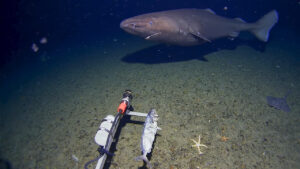If sharks made their own horror films, I’m pretty sure killer whales would be their number-one monster.
A pair of orcas, already known in South Africa for their infamous killing sprees, decided to make a buffet out of 17 seven-gill sharks — in a single day on Feb. 24, according to a marine biologist based in Cape Town.
The two male orcas ate only the livers, leaving the rest of the sharks’ bodies to wash up on shore, Dr. Alison Kock reported in a viral Twitter post that has been shared nearly 300,000 times.
These two killer whales have become minor celebrities in South Africa, where scientists started seeing their shark-killing behavior back in 2015. They’re called Port and Starboard for their bent dorsal fins: one bent to the left and the other to the right.
At least 17 sevengill #sharks have been killed by infamous #killerwhale pair Port & Starboard this week in South Africa. Only the livers were eaten with the leftover carcasses washing ashore [1/3] 📸 @MarineDynamics Christine Wessels pic.twitter.com/PQVk1KI9mF
— Dr. Alison Kock (@UrbanEdgeSharks) February 24, 2023
The ocean’s best killers
While orcas have long been known as the ocean’s fiercest predators, capable of taking out both sharks and large whales, Port and Starboard seem to have developed a special taste for sharks.
In 2017 and 2019, the odd couple killed many great white sharks in South Africa’s False Bay, again eating only their livers. Eventually, nearly all of the bay’s great white sharks moved out of the area — presumably seeking a safer neighborhood.
If you’re wondering why these orcas seem to have an appetite for shark liver, it’s because the liver can account for up to a third of a shark’s body weight, EarthSky reported. The organs are also packed with fats and nutrients the whales need.
As for the orcas’ bent dorsal fins, they’re extremely rare in wild killer whales, leading researchers to speculate that the shark-based diet of Port and Starboard may lack the calcium they need for perky fins. Another theory suggests that pollutants — much more concentrated in top predators like sharks — could be the cause.
Lovers of nature documentaries will likely have seen some form of killer whales’ no-holds-barred predation.
A slew of research has recorded the animals hunting gray whales, humpbacks, and even adult blue whales — the largest animal ever to have lived. Orcas even kill the great white shark, one of cinema’s all-time baddies, with apparent ease, suffering no injuries or even breaking a figurative sweat.
So it’s doubly interesting that killer whales have so little interest in attacking humans. Just four people have been killed by orcas — three of them by the same whale raised in captivity at Sea World, as chronicled in Blackfish.
Maybe we humans just don’t pose enough of a challenge to the ocean’s greatest predator.






